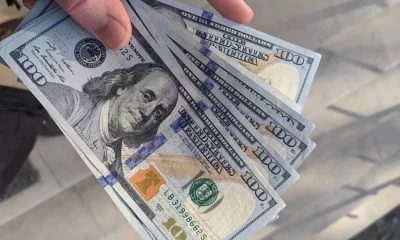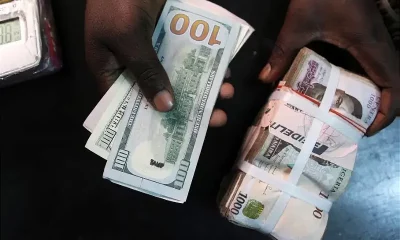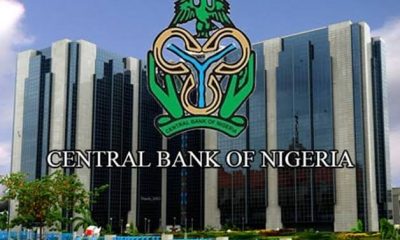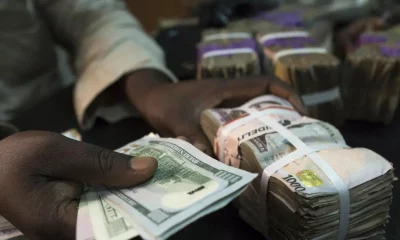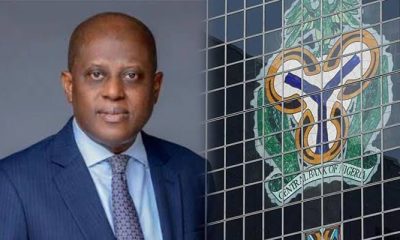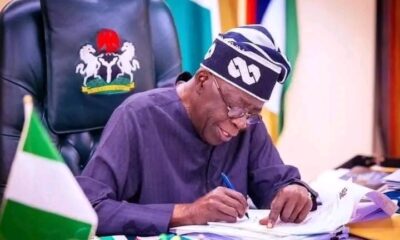Business
CBN Devalues Naira To 630/$1
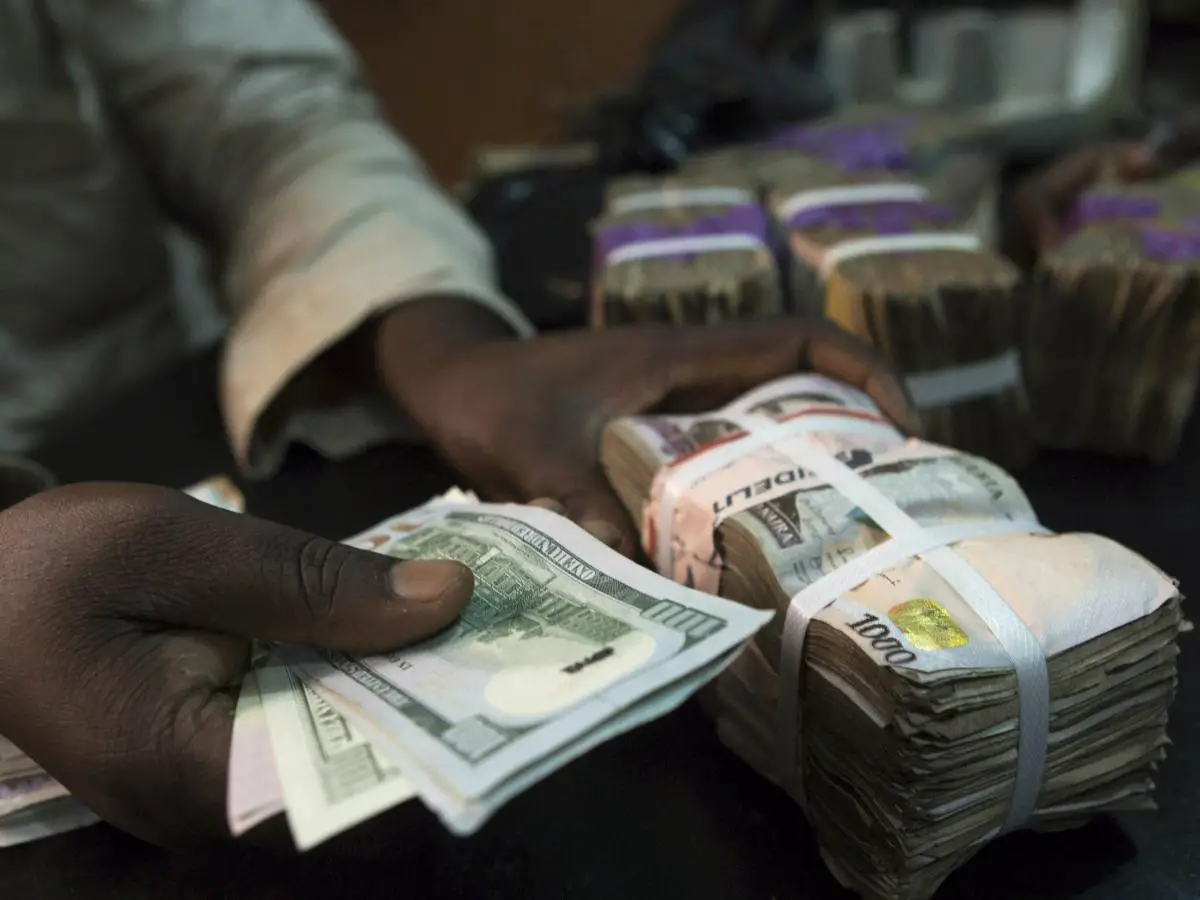
The Central Bank of Nigeria (CBN) has devalued the Naira to N631 to the dollar from N461.6 it sold at the Importers and Exporters (I&E) window the previous day.
The devaluation came 48 hours after President Bola Ahmed Tinubu announced the plans of the federal government to unify the country’s exchange rate to stimulate the economy.
In his inaugural speech, minutes after he was inaugurated as the 16th president of the country, Tinubu said, “Monetary policy needs a thorough house cleaning. The Central Bank must work towards a unified exchange rate. This will direct funds away from arbitrage into meaningful investment in the plant, equipment and jobs that power the real economy.”
There has been a wide margin between the I&E window and the parallel market, a situation that experts say encouraged round-tripping with Bureau de Change operators.
The situation has seen the CBN devise several measures to check the practice as well as completely stop the sale of forex to BDCs.
On Tuesday, President Tinubu met with the top echelon of strategic institutions including the CBN Governor, Godwin Emefiele, at the presidential villa.
At the end of the meeting, neither the presidency nor Emefiele disclosed the outcome of the briefing. It was, however, gathered that the issue of the exchange rate was discussed at the meeting.
The President also met with the Group Chief Executive Officer of the Nigerian National Petroleum Company Limited, Mele Kyari. The removal of petrol subsidy was discussed, it was gathered.
Daily Trust finding, however, revealed that at the resumption of the weekly bidding for foreign exchange, the apex bank sold the spot rate to banks on behalf of their customers at N631 to a dollar and most bidders got the full amount they requested.
One of the customers told this paper that they applied and that their request was fully granted at N631 as against N461.6.
The move has also seen prices at the parallel market trend downwards. Checks by this paper revealed that prices dropped from N750 to a dollar in the early hours of yesterday to N745 by evening in Abuja and Kano respectively.
The naira weakened in the parallel market to the lowest level in a year on expectations of a possible change in exchange rate management after Tinubu takes office on Monday.
The naira dropped to N762 a dollar on Friday from 775 the previous day in the unauthorized market in Lagos, said Umar Salisu, a BDC operator who tracks the data in the nation’s commercial capital.
The unit has weakened steadily in the parallel market since last week after stabilizing for most of this year.
The market arbitrage (difference between the official and parallel markets) has widened in the past three years from N100 per dollar or about 30 per cent in 2020 to over N400 per dollar (above 100 per cent) sometime last year when the black market rate spiked to N880/$.
Development institutions, including the International Monetary Fund (IMF), are wary of exchange rate differential in excess of five per cent and warn that such could trigger unhealthy manipulation that could negatively affect other efforts on market stabilisation.
From 2020 to 2022, the CBN spent about $42 billion intervening in the foreign exchange market to stabilise the naira. The amount was sold to the end-users, including students and tourists, at the official rates, which are way off the effective exchange rate of the naira.
According to the Financial Stability Report, a publication of the CBN, the apex bank sold $9.2 billion in the market in the first half of last year.
The full data for the second half are not available, but the annualised value is assumed to have surpassed that, especially with the level of social and economic activities associated with the second half.
Whereas the black market rate averaged N730/$, the I&E window finished at suppressed N447/$ on average. That puts the arbitrage at N283/$, pushing the CBN’s FX subsidy in the year to about N3.65 trillion.
Realistic exchange rate regime to save N4tr – Ex-DG LCCI
In his analysis on the impact of FX subsidy, Dr Muda Yusuf, the Director of the Centre for Promotion of Private Enterprise (CPPE), said a realistic exchange rate regime would add N4 trillion to the federation account.
The former director general of the Lagos Chamber of Commerce and Industry (LCCI), said the exchange rate regime constitutes an enormous burden to the economy and public finance.
He said: “Nigeria is facing an all-time tight fiscal space. This year’s budget is stuffed with over 50 per cent deficit, even in the face of spurious revenue projections. The federal government is contemplating an additional loan of N8.8 trillion to support funding of the budget, which could raise its outstanding liabilities to nearly N80 trillion.
Devaluation a double-edged sword – Expert
Basil Abia, a private research consultant with a track record of supporting think tanks, start-ups, and development projects in Nigeria, said the devaluation of the naira will result in increased inflation and an erosion of the Nigerian consumer’s already dwindling purchasing power.
However, he adds that there could be some benefits from the devaluation. “If it is perceived to be temporary, it may present attractive opportunities for foreign investors to invest in our domestic financial markets. It is not certain, but it is a possibility that FPI (foreign portfolio
investments) inflow to Nigeria may temporarily increase.”
2023 budget first casualty – Prof. Uwaleke
On his part, a Professor of Capital Market, Uche Uwaleke said, “The first casualty will be the 2023 Appropriation Bill. It means the 2023 budget, which is predicated on N435 per dollar is dead on arrival.”
He said, no doubt, the devaluation will force down the volume of imports and reduce the pressure in the forex market temporarily.
“But have we thought of the impact it would have on the pump price of fuel and the multiplier effects? How about the knock-on with regard to inflation and interest rates, especially at a time when the inflation rate remains elevated? Is high inflation rate not inimical to investments whether local or foreign?” he said.
Business
Seplat Energy celebrates a decade of Dual Listing with Bell Ringing Ceremony at Nigerian Stock Exchange
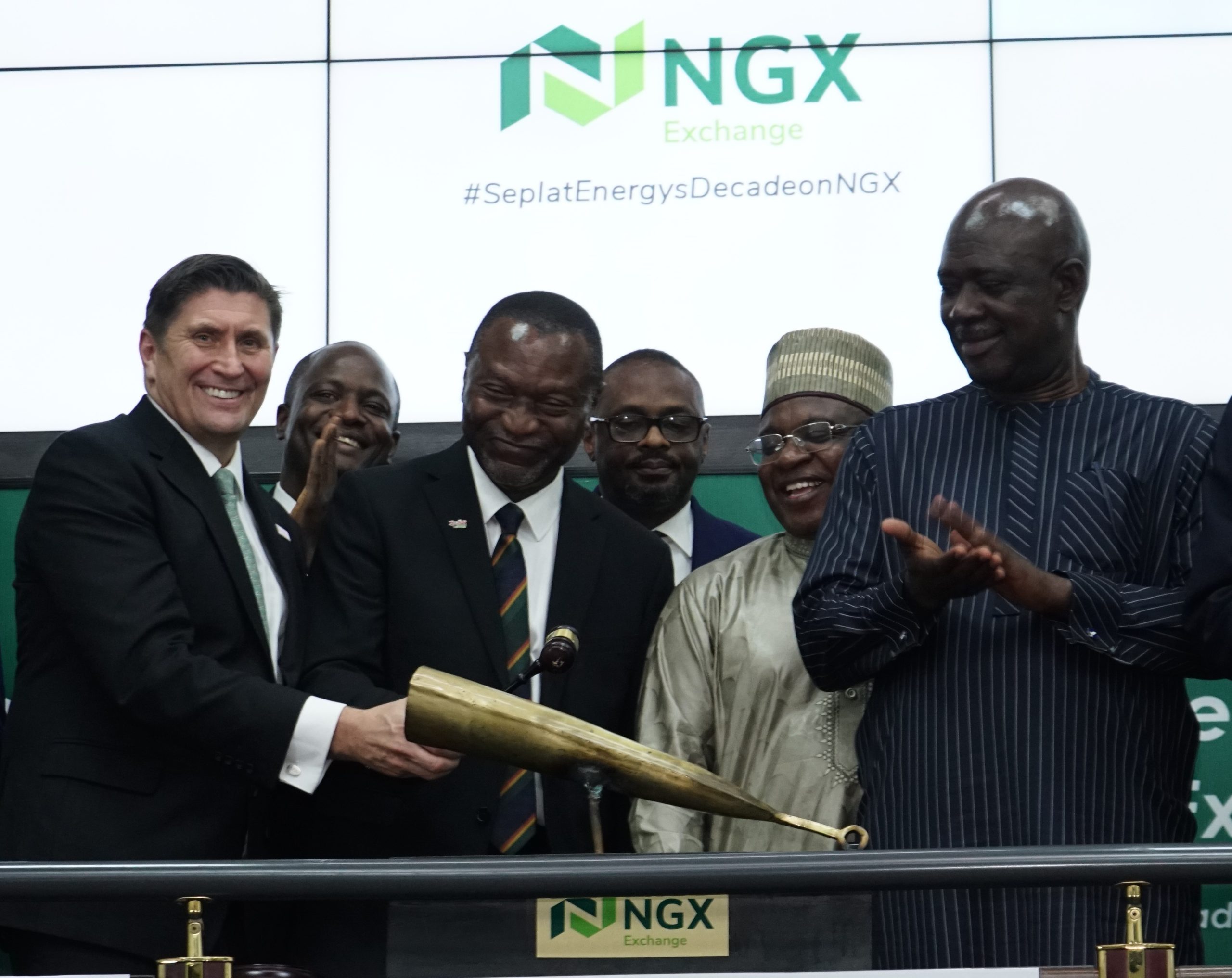
[L-R: Mr. Roger Brown, CEO Seplat Energy Plc; Mr. Temi Popoola, Group CEO, Nigerian Exchange (NGX) Group; Mr. Udoma Udo Udoma, Board Chairman, Seplat Energy Plc; Mr. Jude Chiemeka, Ag. CEO, NGX; Alhaji (Dr.) Umaru Kwairanga, Group Chairman, NGX Group; Sen. Heineken Lokpobiri, Hon. Minister of State for Petroleum Resources (Oil), at the NGX Closing Gong Ceremony to mark a Decade of Listing of Seplat Energy on the NGX and the London Stock Exchange … on Tuesday]
The Nigerian Exchange (NGX) reverberated with the jubilant sound of the bell as Seplat Energy PLC, a leading independent indigenous energy company, celebrates a significant milestone – a decade of its dual listing on both the Premium Board of the Nigerian Exchange (NGX) and the Main Market of the London Stock Exchange (LSE). This commemorative event, attended by esteemed representatives from Seplat Energy, the NGX, the Nigeria government, and other institutional partners, marks a decade of strategic partnership and commitment to excellence in the energy sector.
During his speech at the anniversary, Mr. Roger Brown, CEO, Seplat Energy, expressed delight over the feat, reiterating Seplat Energy’s commitment to leading Nigeria’s energy transition, adding that the power of indigenous companies is to bring growth and prosperity to their home countries and the people. “One example of how Seplat Energy is making an enduring difference to Nigeria and host communities where we operate is that nearly $50m had been invested by our Joint Venture partnerships in communities since our inception to date,” Brown said.
“Truly, Seplat Energy has delivered significant value by enhancing strategic, operational and financial achievements in 10 years as a listed company,” he added.
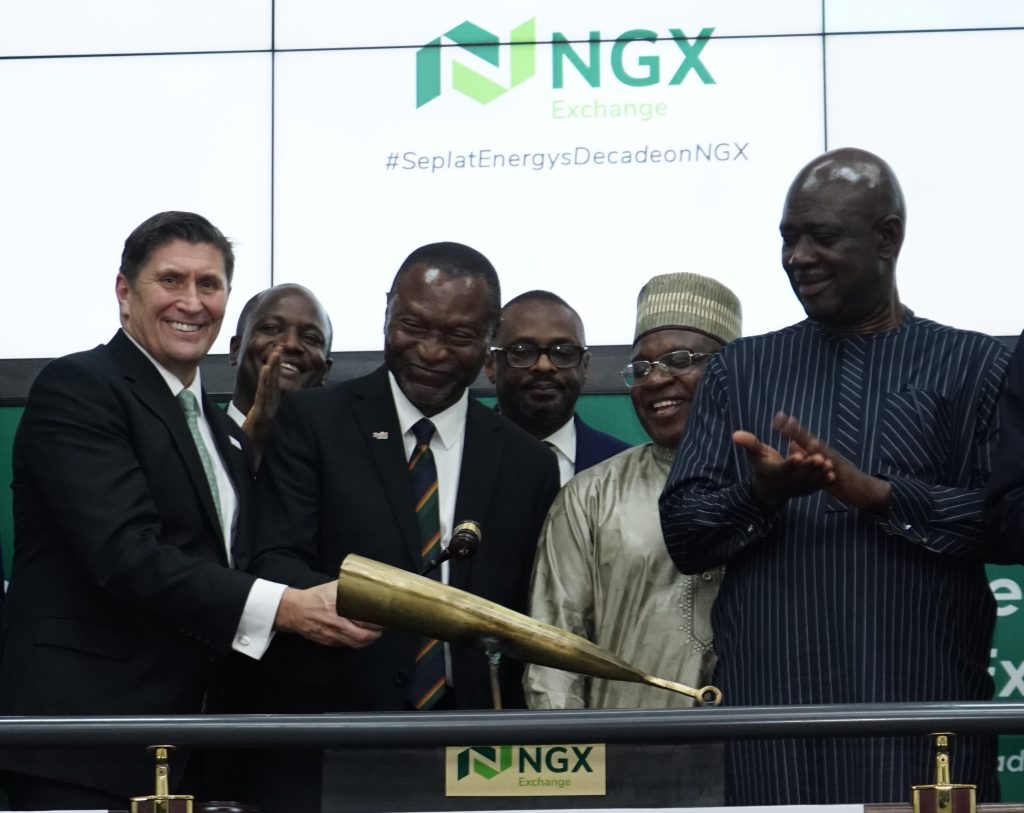
Sen. Heineken Lokpobiri, Hon. Minister of State for Petroleum Resources (Oil); Alhaji (Dr.) Umaru Kwairanga, Group Chairman, NGX Group; ; Mr. Udoma Udo Udoma, Board Chairman, Seplat Energy Plc; Mr. Roger Brown, CEO Seplat Energy; and Mr. Bello Rabiu, Senior Independent Non-Executive Director, Seplat Energy, lead other Directors and Management of Seplat Energy, at the NGX Closing Gong Ceremony to mark a Decade of Listing of Seplat Energy on the NGX and the London Stock Exchange … on Tuesday
In his comments, Mr. Temi Popoola, CEO, NGX Group, emphasized the significance of Seplat Energy’s decade of dual listing stating, “If we were to look back to our market and tried to find landmarks, the last major landmark you will find in the last ten years is this transaction that we are celebrating today, and the market is very grateful for that”.
Congratulating Seplat Energy on this milestone, in his welcoming remarks, Alhaji (Dr.) Umaru Kwairanga, NGX Group Chairman, highlighted the importance of partnerships between the NGX and companies like Seplat Energy in driving economic growth and development stating that “Seplat’s journey symbolises resilience, innovation, and a commitment to excellence, making them a beacon of corporate governance and operational expertise. Seplat Energy has emerged as a leading indigenous energy company, deeply integrated into Nigeria’s economic landscape and the NGX Group remains committed to supporting companies like Seplat Energy as they drive economic growth and contribute to our nation’s prosperity”.
Reflecting on the significance of the decade of dual listing, Mr. Udoma Udo Udoma, Board Chairman, Seplat Energy remarked, “Seplat Energy is committed to driving Nigeria’s transition to sustainable and affordable energy, harnessing its power to improve lives by transforming the economy. We have ambitious goals. We are investing in Nigeria. We will support the federal government’s energy transition policy, and we will partner with FG in whatever area they want us to do so. That is our commitment. We will grow Seplat while also maintaining the highest standard of corporate governance”.
Also commending Seplat Energy on the decade of listing, Jude Chiemeka, Acting CEO, NGX stressed the importance of the capital market in helping companies raise funds and creating wealth for all, stating that “Seplat Energy was listed at 576 Naira at listing and yesterday it closed at 3,370 which is an increase of over 484%. The figures show that in the last 10 years, the company has paid out $575m in dividend payments to shareholders in Nigeria and London where they are also listed, so this company has given investors a huge opportunity to really participate in wealth creation. Reports show that Nigeria would be among the top 20 countries in the next 25 years, and I think Seplat is poised to be one of the institutions driving growth, prosperity, and inclusion in our nation”.
Also gracing the closing gong ceremony was Sen. Heineken Lokpobiri, Minister of State, Petroleum Resources (Oil), who gave kudos to Seplat Energy on their laudable achievements while also assuring of the Federal Government’s commitment to providing support to the company. “I am happy to be part of today’s celebration and Seplat’s exceptional performance in the last ten years and as Minister of State, Petroleum Resources, I assure that we will partner with Seplat to expand their investments, not only for the benefit of its shareholders, but also for Nigeria. The least the government can do anywhere in the world is to create an environment where companies like Seplat continue to thrive”.
Seplat Energy remains focused on driving value for its shareholders, pursuing strategic acquisitions, and championing sustainable practices in the energy sector, with ongoing projects such as the acquisition of Mobil Producing Nigeria Unlimited and the development of the ANOH Gas processing plant. The company’s diversified portfolio, including eight onshore and shallow water assets strategically located in the Niger Delta region, has enabled it to maximize hydrocarbon production while actively contributing to Nigeria’s energy security and economic development.
Seplat Energy’s robust gas portfolio, highlighted by the ANOH Gas processing plant project, underscores its pivotal role in Nigeria’s transition to gas. This aligns with Nigeria’s broader energy goals, promoting cleaner energy sources, reducing reliance on traditional fossil fuels and driving a greener and more sustainable energy landscape in Nigeria.
With commitment to corporate governance, corporate citizenship, and making significant corporate social investments, as reflected in its rigorous approach to performance assessment and its investment in community development initiatives, Seplat Energy is poised for continued success in the years to come.
Business
Naira Appreciates To ₦1,280/$ At Parallel Market
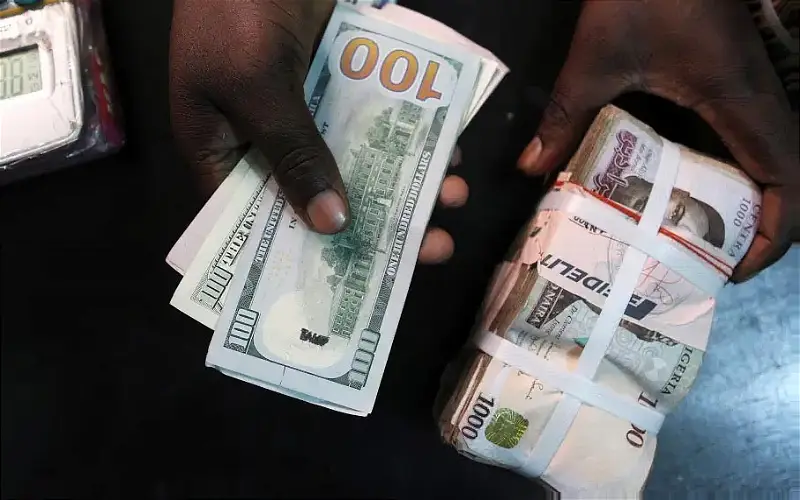
The naira, on Friday, appreciated to N1,280 per dollar at the parallel section of the foreign exchange (FX) market.
The current FX rate signifies a 5.19 percent appreciation from the N1,350/$ reported on March 27.
Currency traders in Lagos, also known as bureau de change (BDCs) operators, quoted the buying rate of the greenback at N1,260 and the selling price at N1,280 — leaving a profit margin of N20.
“The price of the dollar as well as other major currencies have been falling. It is affecting our business as some customers prefer to keep their currencies than change it with us,” a currency trader identified as Aliyu told TheCable.
At the official section of the FX market, the local currency depreciated by 0.69 percent to N1,309.39/$ on March 28 — from N1,300.43/$ on March 27.
Meanwhile, the Central Bank of Nigeria (CBN), on March 29, said the economy recorded over $1.5 billion in foreign exchange (FX) inflow this month, indicating its monetary policy initiatives are effective.
The apex bank said the naira is headed in the right direction, and the administration of Yemi Cardoso, CBN governor, remains committed to ensuring the stability of the market and the appropriate pricing of the naira against other major currencies worldwide.
-
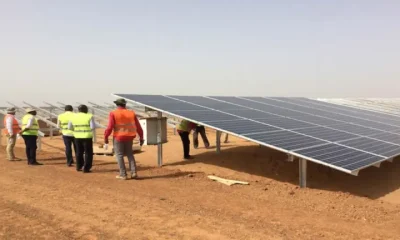
 News7 days ago
News7 days agoFG To Provide Solar Subsidy In Nigeria Through $750 Million World Bank Loan
-

 Headline7 days ago
Headline7 days agoLassa Fever Kills 150 In Nigeria — NCDC
-
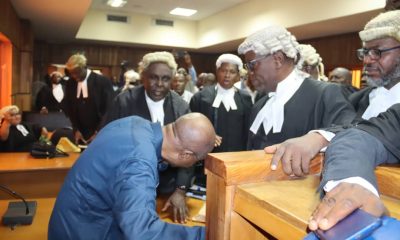
 News7 days ago
News7 days agoLagos Court Grants Emefiele N50m Bail
-

 Headline7 days ago
Headline7 days agoUnknown Gunmen Abduct Channelstv Reporter In Port-harcourt
-
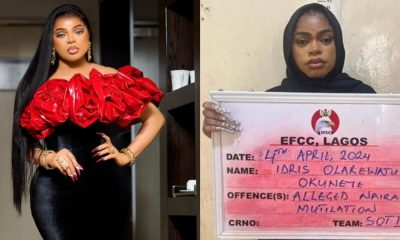
 News7 days ago
News7 days agoBreaking…Naira abuse: Court sentences Bobrisky to 6 months in custody
-

 Foreign7 days ago
Foreign7 days ago3 teens arrested in Germany for allegedly plotting terror attack
-

 Business13 hours ago
Business13 hours agoSeplat Energy celebrates a decade of Dual Listing with Bell Ringing Ceremony at Nigerian Stock Exchange

